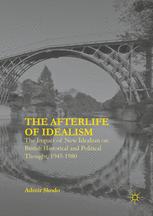

Most ebook files are in PDF format, so you can easily read them using various software such as Foxit Reader or directly on the Google Chrome browser.
Some ebook files are released by publishers in other formats such as .awz, .mobi, .epub, .fb2, etc. You may need to install specific software to read these formats on mobile/PC, such as Calibre.
Please read the tutorial at this link: https://ebookbell.com/faq
We offer FREE conversion to the popular formats you request; however, this may take some time. Therefore, right after payment, please email us, and we will try to provide the service as quickly as possible.
For some exceptional file formats or broken links (if any), please refrain from opening any disputes. Instead, email us first, and we will try to assist within a maximum of 6 hours.
EbookBell Team

4.0
86 reviewsThis book examines the legacy of philosophical idealism in twentieth century British historical and political thought. It demonstrates that the absolute idealism of the nineteenth century was radically transformed by R.G. Collingwood, Michael Oakeshott, and Benedetto Croce. These new idealists developed a new philosophy of history with an emphasis on the study of human agency, and historicist humanism. This study unearths the impact of the new idealism on the thought of a group of prominent revisionist historians in the welfare state period, focusing on E.H. Carr, Isaiah Berlin, G.R. Elton, Peter Laslett, and George Kitson Clark. It shows that these historians used the new idealism to restate the nature of history and to revise modern English history against the backdrop of the intellectual, social and political problems of the welfare state period, thus making new idealist revisionism a key tradition in early postwar historiography.